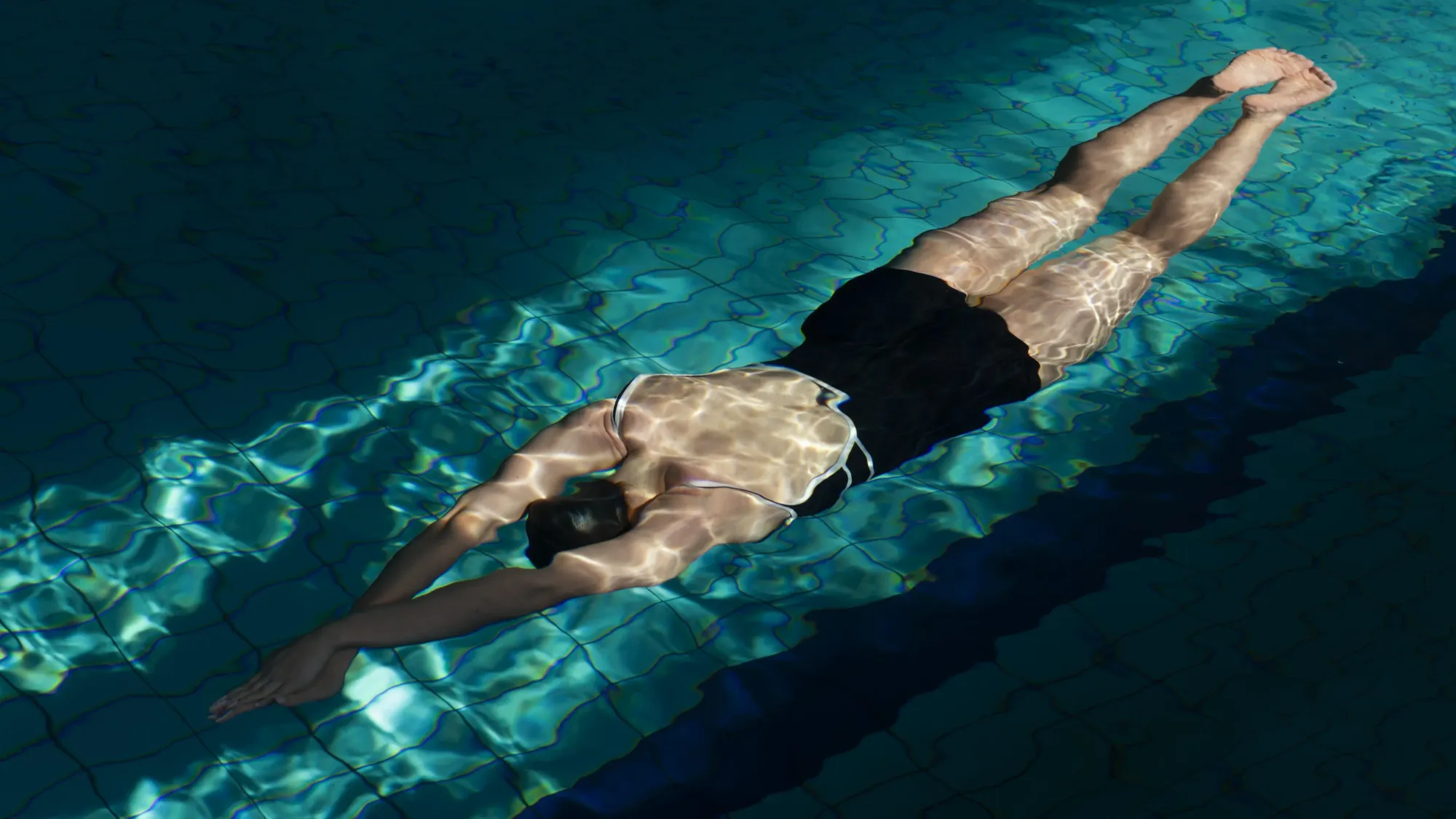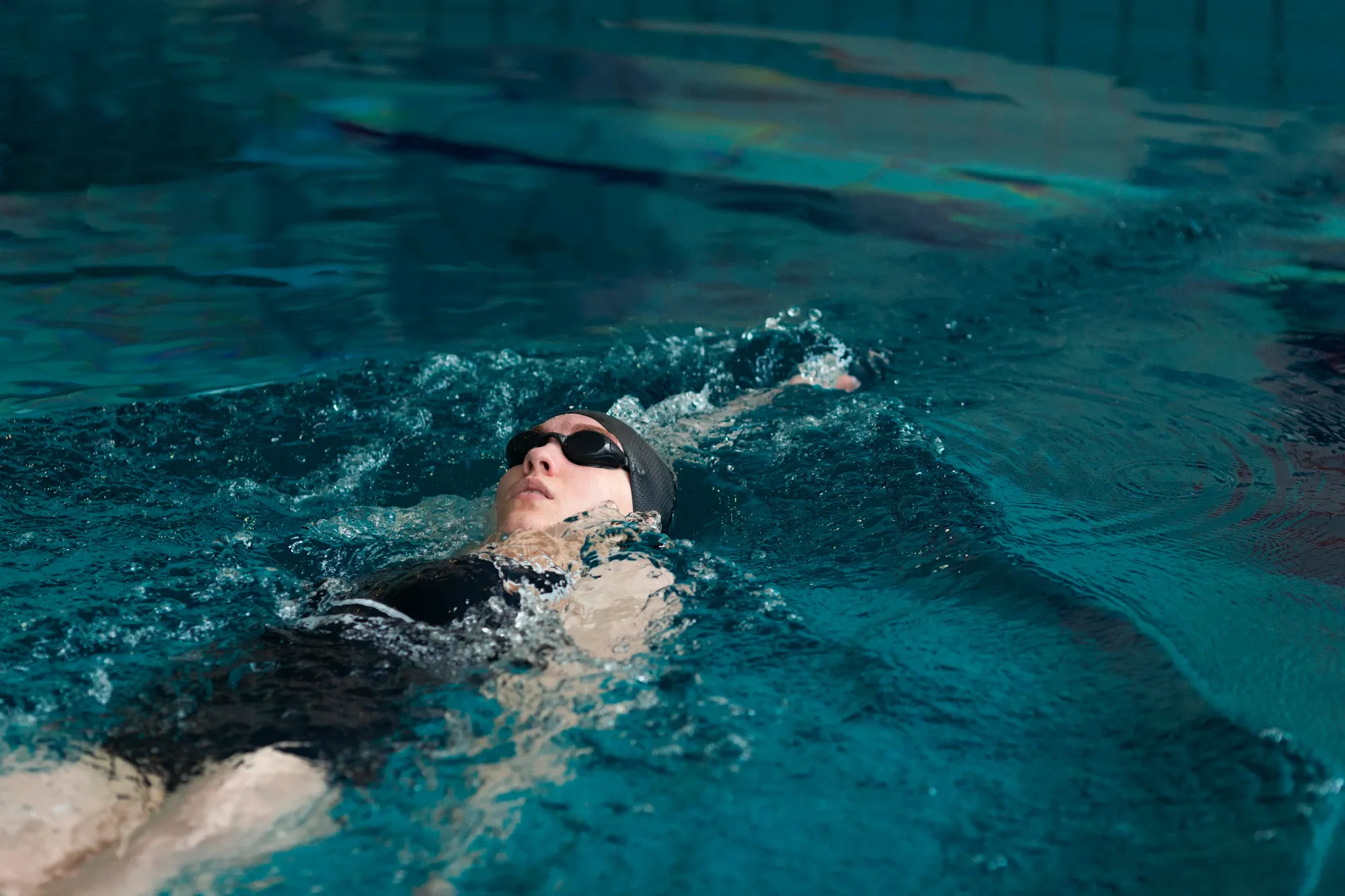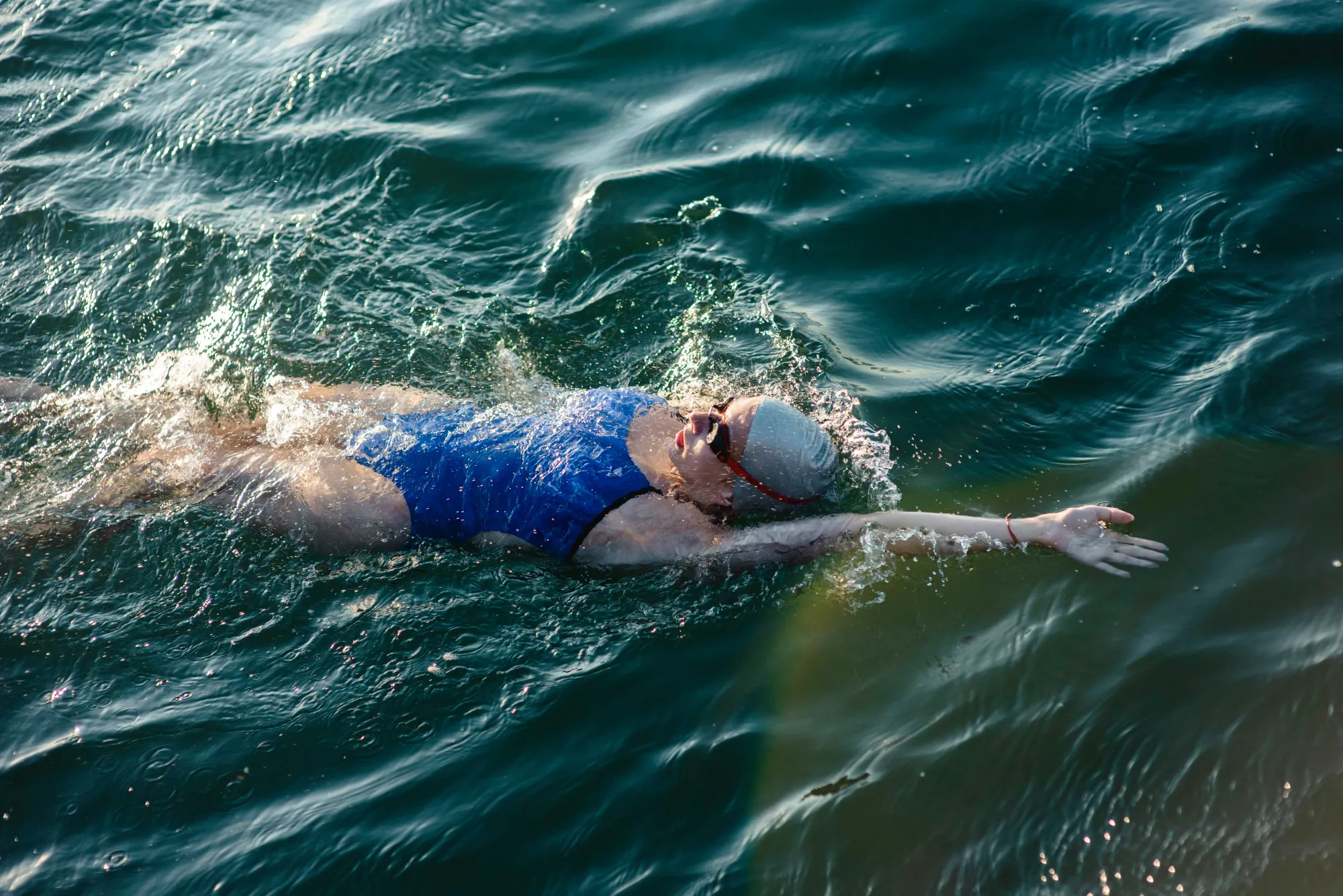The Swimmer's Guide to Skin Care: How to Prevent Chlorine Dryness

You love the feeling of gliding through the water, the quiet rhythm of your strokes, and the weightlessness of a good swim. But what you hate is the tight, itchy, and irritated skin that follows. It's a frustratingly common problem, but it doesn’t have to be your reality. This guide provides a simple, dermatologist-backed routine to protect your skin from chlorine, so you can enjoy your swim without the uncomfortable after-effects.
Is Chlorine Bad for Your Skin?
This is the big question, and the answer is a bit more complex than a simple yes or no. Chlorine itself is a necessary disinfectant, but its interaction with your skin and the water around it is what causes the classic post-swim irritation.
The Real Irritant: Chloramines
That strong "pool smell" you associate with chlorine? It's usually not from chlorine itself, but from compounds called chloramines. These are formed when chlorine disinfects the water by reacting with organic materials like sweat, body oils, and lotions. According to health experts, chloramines are far more irritating to skin and eyes than free chlorine, which is why a clean, well-maintained pool often feels much gentler on your skin.
How Chlorine Strips Your Skin’s Natural Barrier
Your skin has a natural, oily layer on its surface called sebum. This forms a protective barrier that locks in moisture and keeps irritants out. Chlorine, being highly effective at breaking down organic materials, strips away this vital barrier. Without it, your skin loses moisture rapidly, leading to the dryness, tightness, and itching you feel after leaving the pool. It's important to note that this reaction is a form of irritant dermatitis, which is different from true "swimmer's itch," a parasitic infection from natural bodies of water.

Your Pre-Swim Action Plan: A 2-Step Protective Barrier
The best defense is a proactive one. These simple steps create a shield to minimize the initial chemical assault.
Step 1: The 60-Second Pre-Rinse
Before you dive in, take a quick shower with clean, non-chlorinated water. Your skin is like a sponge; it's better to let it soak up clean water first. This simple step leaves less room for chlorinated water to be absorbed, minimizing its drying effects.
Step 2: Create a Shield for Your Skin
Apply a barrier product 10-15 minutes before swimming to form a water-repellent layer on your skin. This shield locks in moisture and blocks chemicals.
- Gold Standard Options: Look for products containing petrolatum or dimethicone. These create a highly effective, durable barrier without feeling greasy.
- Natural Alternatives: Plant-based oils like coconut oil or shea butter can also offer protection.
- For Outdoor Swims: A mineral-based sunscreen (with Zinc Oxide or Titanium Dioxide) is an excellent dual-purpose choice, protecting from both UV rays and chlorine.
The Post-Swim Recovery Regimen: Neutralize and Rebuild
What you do after your swim is a race against time to halt damage and begin repairs.
Step 1: Rinse Immediately & Gently Cleanse
As soon as you exit the pool, head for a lukewarm shower—hot water will only strip your skin further. Wash with a mild, pH-balanced, sulfate-free cleanser to remove chlorine residue without causing more irritation.
Step 2: Neutralize Lingering Chlorine with This Expert Trick
Even after showering, chlorine can remain chemically bound to your skin. To deactivate it, use Vitamin C, a powerful antioxidant that neutralizes chlorine on contact.
- How to Use: After rinsing, use a topical Vitamin C spray or serum on your body. Allow it to sit for a minute before your final rinse. You can even make your own by dissolving one teaspoon of ascorbic acid powder into a cup of water in a spray bottle.
Step 3: Moisturize with the Right Ingredients (Within 3 Minutes)
You have a critical 3-minute window after patting your skin dry to apply moisturizer. Applying it while your skin is still slightly damp traps moisture and dramatically increases effectiveness. Look for products containing a mix of these powerhouse ingredients:
- Barrier Repair Agents (Ceramides, Niacinamide): These are the most important. Ceramides directly replenish the lipids chlorine stripped away. Niacinamide helps your skin rebuild its own barrier and reduces redness.
- Humectants (Hyaluronic Acid, Glycerin): These are "moisture magnets" that pull hydration deep into your skin.
- Emollients (Shea Butter, Squalane): These oils fill in the gaps between skin cells, making skin feel smooth and soft.

Does Chlorine Help Acne? Here's the Truth
This is one of the most debated topics among swimmers, and the high search volume for this question shows the confusion. Many people anecdotally report that their acne improves after swimming. Let's break down why that might seem to be the case—and what’s really happening.
Why Some Swimmers Think Chlorine Clears Their Skin
There is a kernel of truth here. Chlorine is antibacterial, and it can dry out the surface of the skin. This combination can temporarily reduce surface bacteria and dry up existing pimples, leading to the appearance of clearer skin in the short term.
Why Irritation Leads to More Breakouts
Unfortunately, any short-term benefits are quickly outweighed by the long-term damage. By stripping your skin's protective barrier, chlorine causes inflammation and irritation. Your skin's response to this stress is often to overproduce oil to compensate for the extreme dryness. This excess oil, combined with an inflamed and compromised barrier, is the perfect recipe for future breakouts. The expert consensus is clear: chlorine is not a sustainable or healthy treatment for acne.
A Well-Maintained Pool: Your First Line of Defense
While your personal skincare routine is vital, the environment you swim in plays a huge role in how your skin feels.
How Balanced Water Chemistry Creates a Gentler Swim
A pool with properly balanced pH and alkalinity levels is a much healthier environment for your skin. When the water chemistry is off, it can become significantly more harsh and abrasive, compounding the irritating effects of sanitizers.
Fewer Contaminants Mean Fewer Irritants
Remember those irritating chloramines? They are formed when chlorine has to work overtime to neutralize a high load of organic contaminants like debris, sweat, and oils. The key to a gentler swim is to remove these contaminants from the water consistently. This is where Aiper pool cleaners make a significant difference, as it actively scrub surfaces and filter out the very materials that lead to skin and eye irritation. A physically cleaner pool requires less chemical intervention and produces fewer of these nasty irritants, making the water fundamentally gentler on your skin.
Swim Confidently Without Worrying About Your Skin
You don’t have to choose between your passion for swimming and the health of your skin. By building a simple routine—protecting before, rinsing and moisturizing after, and always choosing a clean, well-maintained pool—you can have the best of both worlds. Now you have the knowledge to dive in confidently, knowing your skin is protected.
Frequently Asked Questions About Swimmer's Skincare
Q: What skincare should swimmers use?
A: A complete skincare routine for swimmers should include three key products: a pre-swim barrier cream (with petrolatum or dimethicone) to protect the skin, a gentle, pH-balanced cleanser for use immediately after swimming, and a repairing moisturizer containing ingredients like ceramides and hyaluronic acid to rehydrate and rebuild the skin's barrier.
Q: What do professional swimmers put on their skin?
A: Professional swimmers adhere to a strict and consistent routine due to their long hours in the pool. They typically use heavy-duty pre-swim barrier creams to minimize chlorine absorption. Their post-swim care is focused on immediate showering and applying intensive, high-quality moisturizers rich in ceramides and emollients to combat the severe drying effects of daily, prolonged chlorine exposure.
Q: Is it bad to swim in chlorine every day?
A: Swimming daily in chlorine poses a significant challenge to your skin's health, but it can be managed with the proper precautions. The key is consistency. If you swim daily, it's crucial to apply a pre-swim barrier and follow a post-swim neutralization and moisturizing routine every time to prevent cumulative damage and chronic dryness.
Q: What happens if you don't wash chlorine off your skin?
A: If you don't wash chlorine off your skin, it continues to cause damage long after you've left the pool. Lingering chlorine and chloramines continue to strip the skin's natural oils, break down its protective barrier, and cause oxidative stress. This leads to prolonged itching, severe dryness, potential rashes (irritant dermatitis), and can worsen conditions like acne and eczema.
Q: Should you shower after swimming in chlorine?
A: Yes, absolutely. Showering in lukewarm, fresh water immediately after swimming is the single most important step in a post-swim routine. It physically removes the majority of chlorine and irritating chloramines from your skin's surface, halting the damaging chemical reactions.
Q: Is swimming in a pool as good as taking a shower?
A: No, swimming in a pool is not a substitute for a shower. In fact, it's the opposite. Pool water contains chlorine, chemicals, and contaminants that need to be washed off your body. A proper shower with a gentle cleanser after swimming is essential to actually clean your skin and remove these irritating residues.

